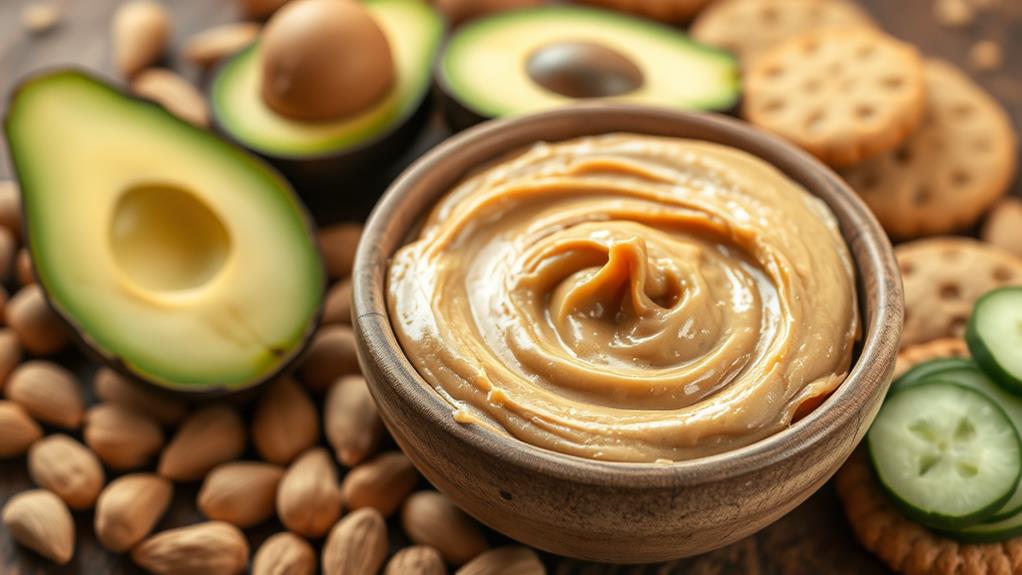Peanut butter makes a great keto snack because it's low in net carbs and packed with healthy fats and protein. A typical serving contains about 2-4 grams of net carbs, allowing you to enjoy it without breaking your carb limit. Plus, it offers around 16 grams of healthy fats, primarily monounsaturated, which are good for your heart. When choosing peanut butter, opt for natural varieties with just peanuts and salt to avoid added sugars. With its versatility, you can easily incorporate it into snacks or meals. Stick around, and you'll discover more ways to enjoy this delicious treat!
Understanding Peanut Butter
Understanding peanut butter is essential for anyone considering it as a keto snack. This nut butter, made primarily from ground peanuts, is packed with nutrients that align well with the keto diet. A typical serving of peanut butter, about 2 tablespoons, contains roughly 7 grams of total carbohydrates, but with fiber factored in, you're looking at around 5 grams of net carbs. That makes it a solid choice when you're aiming to keep your carb intake low.
Additionally, peanut butter can be a great alternative to other keto-friendly nuts, such as almonds, which also provide healthy fats and protein.
When selecting peanut butter, you'll want to be mindful of added sugar and hydrogenated oils, as these can derail your keto goals. Opt for natural varieties that contain just peanuts and salt to stay on track.
Peanut butter isn't only low in carbs; it's also rich in healthy fats, boasting around 16 grams per serving. These fats are primarily monounsaturated, which support heart health and can keep you feeling satiated.
Plus, with about 8 grams of protein per serving, peanut butter can help curb your hunger and support muscle maintenance. So if you're looking for a tasty keto-friendly snack, peanut butter could be your go-to option.
Nutritional Profile of Peanut Butter
Peanut butter's nutritional profile makes it a standout choice for those following a keto diet. With around 7 grams of total carbohydrates and only 2-4 grams of net carbs per 2-tablespoon serving, it fits perfectly into your low-carb peanut butter options when consumed in moderation.
Each serving also packs about 16 grams of healthy fats, primarily from monounsaturated and polyunsaturated fatty acids, which are great for heart health. Additionally, peanut butter can be a part of a vegetarian high-protein keto diet that supports weight management and muscle maintenance.
You'll also find around 8 grams of protein in a serving, helping you feel full and supporting muscle maintenance as you stick to your ketogenic eating plan.
Additionally, peanut butter is rich in essential vitamins and minerals like vitamin E, magnesium, and potassium, all of which play significant roles in your overall health and energy production.
The high fiber content, approximately 3 grams per serving, aids digestive health and helps regulate blood sugar levels.
This combination of low grams of net carbs, healthy fats, and grams of protein makes peanut butter not just a tasty treat, but a smart choice for your keto lifestyle. Enjoy it as a satisfying snack or mix it into your favorite recipes!
Choosing the Right Peanut Butter
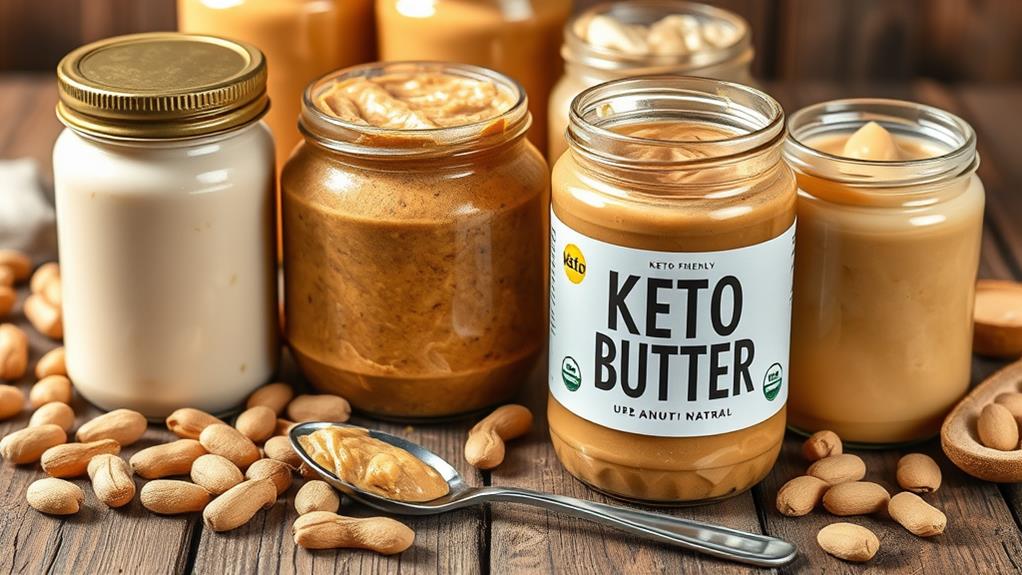
When it comes to selecting the right peanut butter for your keto diet, simplicity is key. You want to choose options with minimal ingredients, ideally just peanuts and salt. This helps you avoid added sugars and unhealthy oils that can sneak in and increase carb counts.
Additionally, be mindful of the nutritional benefits that other low-carb foods, such as mustard, can offer when incorporated into your diet essential nutrients from mustard. Look for natural peanut butter, which typically contains about 6-7 grams of total carbs and 2-4 grams of net carbs per 2-tablespoon serving.
Be cautious with reduced-fat peanut butters; they often contain added sugars that can push your carb intake beyond keto limits. Brands like Smucker's Natural or Peanut Butter & Co. Simply Smooth/Crunchy are great choices, as they focus on clean ingredients without hidden sugars.
Always scrutinize the nutrition label before making your purchase. Verify there are no hydrogenated oils listed, as these are linked to adverse health effects.
Risks and Considerations
When enjoying peanut butter on your keto journey, you need to be aware of potential risks like aflatoxins, which can affect your liver over time.
Additionally, nuts and seeds in general are nutrient-dense and can provide health benefits when consumed wisely, making it important to choose your nut butters carefully nutritional benefits of nuts.
Portion control is essential, as even a couple of tablespoons can quickly add up in carbs and calories.
Keep your intake balanced to stay on track with your goals.
Aflatoxin Concerns
Aflatoxin concerns can be a significant consideration for those incorporating peanut butter into their keto snacks. Aflatoxins are naturally occurring toxins produced by certain molds that can grow on peanuts, posing serious health risks like liver damage and cancer with long-term exposure.
Fortunately, both the USDA and FDA monitor peanut products to guarantee aflatoxin levels remain below safety thresholds, which helps mitigate these risks.
When choosing peanut butter, opt for reputable brands that prioritize quality control. These brands adhere to strict measures to limit aflatoxin presence, making their products safer for consumption. Regular testing and proper storage conditions also play an essential role in reducing the risk of aflatoxin contamination in peanut butter.
If you're particularly concerned about aflatoxin exposure, consider selecting peanut butter made from peanuts grown in regions known for lower aflatoxin prevalence. Additionally, look for brands that conduct rigorous testing to guarantee their products meet safety standards.
Portion Control Importance
While enjoying peanut butter as a keto snack, it's important to be mindful of portion control. A standard serving size is just 2 tablespoons (32 grams), and it's easy to exceed this if you're not measuring accurately. Consuming more than the recommended amount can lead to excessive calorie intake, jeopardizing your weight loss efforts on a high fat diet.
Each 2-tablespoon serving contains about 7 grams of carbs, so monitoring your portions is essential to stay within your daily carb limits. Overindulgence in peanut butter may also spike your fat intake, potentially pushing you over the keto macro ratio of 60-80% calories from fat.
This can make it challenging to maintain the intended benefits of the diet. To avoid these pitfalls, regularly check your serving sizes and track your intake. This simple practice helps you enjoy peanut butter while adhering to your keto plan without unintended consequences.
Keto-Friendly Alternatives to Peanut Butter
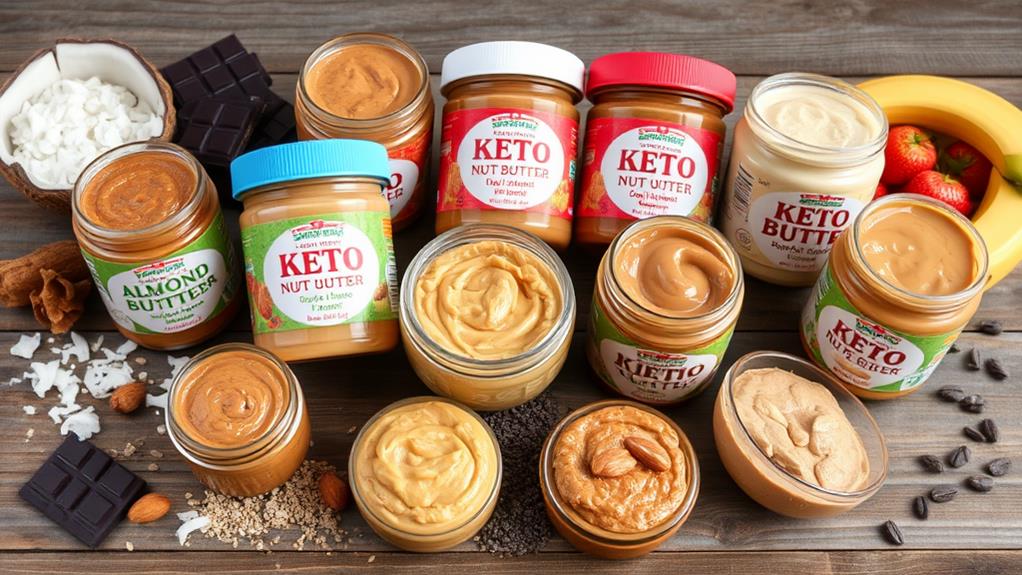
If you're looking for keto-friendly alternatives to peanut butter, you've got some tasty options.
Almond butter and macadamia nut butter pack healthy fats and lower carb counts, making them excellent choices for maintaining ketosis.
Additionally, consider incorporating healthy oils and fats like coconut oil or olive oil into your snacks for added nutrition, while sunflower seed butter is perfect if you need a nut-free choice.
Plus, spreads like tahini can add unique flavors to your snacks, keeping your keto diet exciting.
Nut Butter Options
When you're searching for keto-friendly nut butter options, almond butter often stands out as a top choice. With about 6g total carbs and just 3g net carbs per 2 tablespoons, it's lower in carbs than traditional peanut butter, making it a smart addition to your diet.
If you're looking to mix things up, consider macadamia nut butter. It boasts around 2g net carbs per tablespoon and is packed with healthy fats, perfect for maintaining energy on a keto plan.
For those with nut allergies, sunflower seed butter provides a nut-free alternative, typically containing around 4g net carbs per 2 tablespoons, so you can enjoy a creamy spread without worry.
While cashew butter is slightly higher in carbs—about 9g total carbs and 7g net carbs per 2 tablespoons—it can still fit into a keto lifestyle when enjoyed in moderation.
Finally, tahini, made from ground sesame seeds, is another excellent option, offering around 4g net carbs per 2 tablespoons and a good dose of calcium and healthy fats.
With these options, you can easily find nut butter alternatives that align with your keto goals.
Seed Butter Alternatives
Seed butter alternatives offer a fantastic way to enjoy creamy spreads without the carbs of traditional peanut butter. If you're following a ketogenic diet, sunflower seed butter and tahini are excellent options that provide both healthy fats and essential nutrients. Sunflower seed butter packs about 4g net carbs per 2 tablespoons, making it a suitable choice for keto enthusiasts.
On the other hand, tahini, made from ground sesame seeds, boasts approximately 3g net carbs per 2 tablespoons. It's not only low in carbs but also rich in calcium and healthy fats, ensuring you get a nutritious boost with every spoonful.
Both of these seed butter alternatives are nut-free, making them perfect for anyone with nut allergies while still adhering to keto guidelines. When selecting your seed butter, be sure to choose varieties that don't contain added sugars or unhealthy oils.
This way, you maintain their keto compatibility and enjoy their numerous health benefits. So, whether you're looking for a spread for your low-carb bread or a dip for veggies, these seed butters are a smart, keto-friendly choice!
Flavorful Spreads Comparison
Exploring flavorful spreads can enhance your keto snacking experience, especially when looking for alternatives to peanut butter.
If you're searching for a keto-friendly alternative, consider these delicious options that fit into your low-carb diet:
- Almond Butter: Packed with healthy fats, it contains about 6 grams of total carbs and 3 grams of net carbs per 2 tablespoons, making it a solid choice.
- Sunflower Seed Butter: This nut-free option offers about 4 grams of net carbs per 2 tablespoons. It's perfect if you have nut allergies while still enjoying a creamy spread.
- Macadamia Nut Butter: A rich source of monounsaturated fats, it boasts around 4 grams of net carbs per 2 tablespoons, supporting heart health without compromising your keto goals.
- Tahini: Made from sesame seeds, tahini provides a unique flavor with about 4 grams of net carbs per 2 tablespoons and can elevate many dishes.
These alternatives not only bring variety to your snacks but also guarantee you stay within your carb limits while enjoying the creamy textures similar to traditional peanut butters.
Incorporating Peanut Butter Into Your Diet
Peanut butter can be a delicious and versatile addition to your keto diet. With approximately 2-4 grams of net carbs per 2-tablespoon serving, it's a low-carb option you can enjoy without guilt.
When incorporating peanut butter into your diet, opt for natural varieties containing just peanuts and salt. This way, you'll avoid added sugars and unhealthy oils that can derail your keto goals. Additionally, pairing peanut butter with popular keto-friendly nuts can further enhance the nutritional profile of your snacks.
To make the most of peanut butter, consider pairing it with low-carb fruits like strawberries or celery sticks. This combination creates a satisfying snack while keeping your carb intake in check. You can also use peanut butter as a base for keto-friendly recipes, like fat bombs or smoothies, allowing you to boost your healthy fat intake easily.
However, be mindful of portion sizes. A standard serving is only 2 tablespoons, which can be more calorie-dense than you expect.
Peanut Butter Recipes for Keto
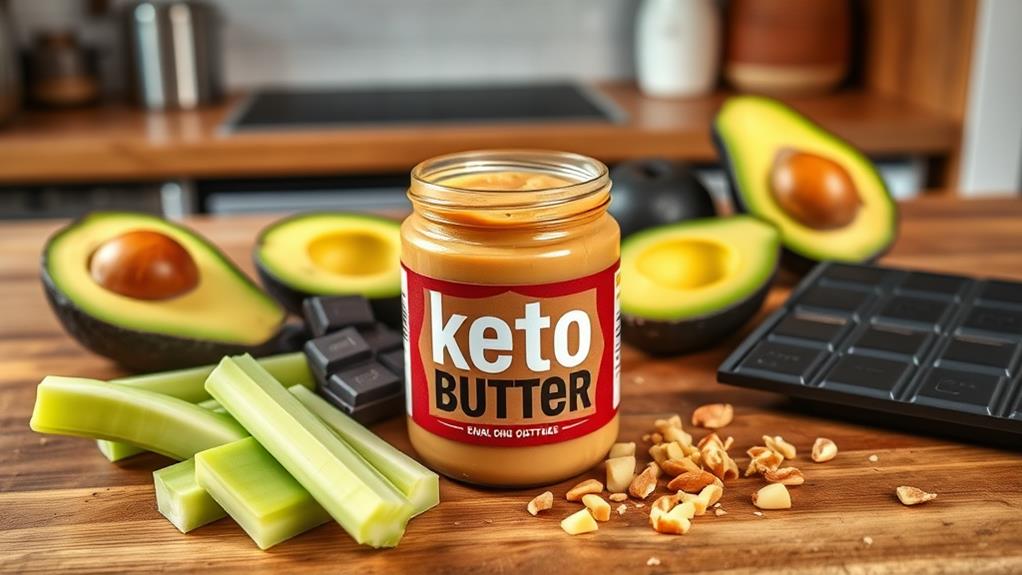
Delicious keto-friendly recipes using peanut butter can satisfy your cravings while keeping your carb intake low.
These peanut butter recipes for keto not only taste great but also fit perfectly within your dietary goals. Here are four simple ideas to get you started:
- Keto Peanut Butter Cups: Combine coconut oil, keto-friendly peanut butter, cocoa powder, and a sugar-free sweetener. These treats have minimal carb count and high grams of fat, making them ideal for your keto lifestyle.
- Keto Peanut Butter Cookies: Mix peanut butter, an egg, and a natural sweetener, then bake at 350°F for 10-12 minutes. These cookies are quick to whip up and provide a satisfying snack.
- Creamy Peanut Butter Cheesecake Balls: Blend cream cheese, peanut butter, and a sweetener, roll them into balls, and freeze. They make a revitalizing dessert packed with flavor.
- Keto Peanut Butter Fudge: Melt butter, add brown sugar sweetener, and peanut butter for a creamy, nostalgic treat that fits your keto guidelines.
These recipes will keep your taste buds happy while ensuring you stay on track with your low-carb goals!
Health Benefits of Peanut Butter
When you're looking for a nutritious snack that aligns with your keto diet, peanut butter stands out as a powerhouse of health benefits. Each 2-tablespoon serving packs about 16g of healthy fat, essential for meeting the high-fat requirements of a ketogenic lifestyle. This makes it not only satiating but also supportive of your weight management goals.
Peanut butter is low in carbs, containing just 2-4g of net carbs per serving, which fits well within your daily carb limits. You'll also benefit from around 8g of protein, promoting muscle maintenance and helping you feel full longer.
Beyond its macronutrient profile, peanut butter is rich in essential vitamins and minerals. It provides vitamin E, magnesium, and potassium, all of which are important for your overall health and wellness. These nutrients support various bodily functions, from muscle contraction to immune health.
Additionally, the monounsaturated fats in peanut butter can help lower LDL cholesterol levels, promoting heart health while you stick to your keto plan.
Tips for Enjoying Peanut Butter
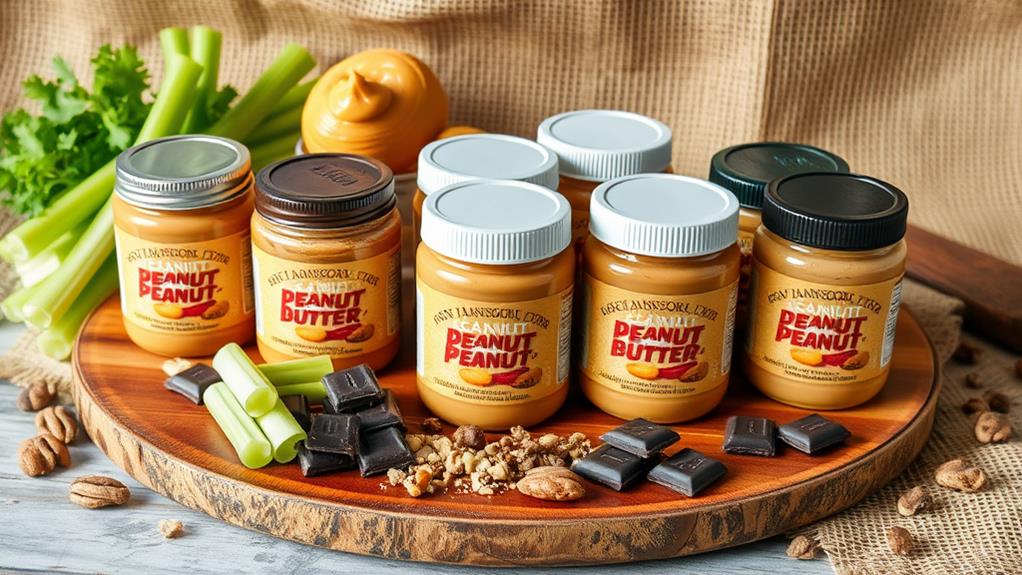
Snack time can be a real challenge on a keto diet, but incorporating peanut butter can make it easier and more enjoyable. To help you savor this delicious treat while sticking to your goals, here are some tips:
- Choose Natural Options: Always opt for natural crunchy peanut butter with minimal ingredients—just peanuts and salt—to steer clear of added sugars that can disrupt ketosis.
- Mind Your Portions: A standard serving size is two tablespoons (32g), which contains about 6-7 grams of total carbohydrates. Keep your daily carb intake in check by enjoying small amounts throughout the day.
- Pair with Low-Carb Veggies: For a satisfying snack, pair peanut butter with low-carb vegetables like celery or cucumber. This combo adds crunch and increases fiber without throwing off your keto balance.
- Get Creative: Use peanut butter in keto-friendly recipes like cookies or fat bombs. This way, you can indulge your sweet tooth while staying within your macronutrient goals.
With these tips, you can enjoy peanut butter while maintaining your keto lifestyle!
Conclusion
Peanut butter can be both your creamy delight and keto ally. While it packs healthy fats and protein, the key is choosing the right brand and portion size. Embrace its versatility in snacks and recipes, but stay mindful of added sugars. With the right approach, you can indulge in this rich treat without derailing your keto journey. So go ahead, spread some joy on your low-carb adventures—just remember to keep it balanced!

